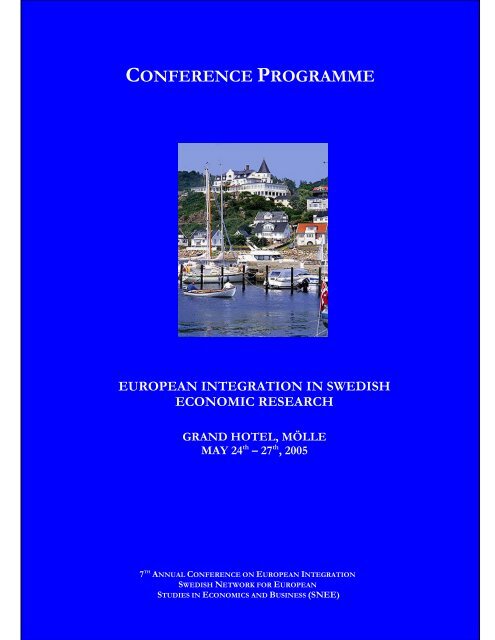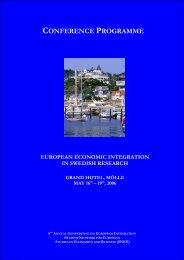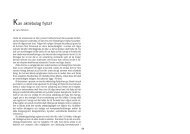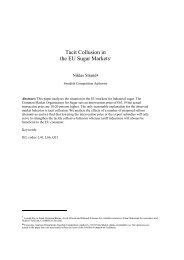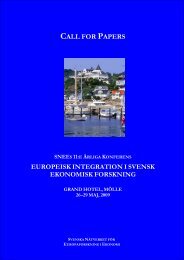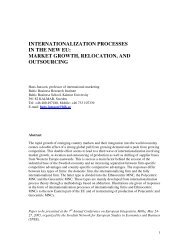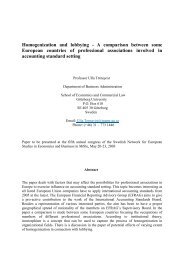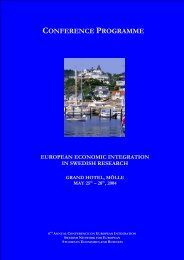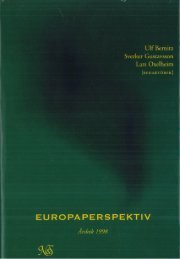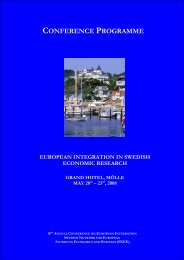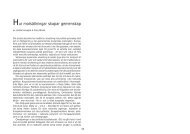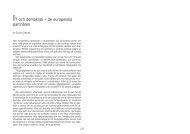Programme (version May 12) - SNEE
Programme (version May 12) - SNEE
Programme (version May 12) - SNEE
- No tags were found...
Create successful ePaper yourself
Turn your PDF publications into a flip-book with our unique Google optimized e-Paper software.
CONFERENCE PROGRAMMEEUROPEAN INTEGRATION IN SWEDISHECONOMIC RESEARCHGRAND HOTEL, MÖLLEMAY 24 th – 27 th , 20057 TH ANNUAL CONFERENCE ON EUROPEAN INTEGRATIONSWEDISH NETWORK FOR EUROPEANSTUDIES IN ECONOMICS AND BUSINESS (<strong>SNEE</strong>)
European Integration in Swedish Economic ResearchFive years after the launching of the Lisbon agenda, the European Commission recognizes that ‘not only are wegoing to fall short of the strategic objective set in Lisbon of being the most competitive, most innovative economyin the year 2010, and thereby ensuring a high level of employment, but […] we have fallen even further behind inglobal competitiveness.’ Part of the reason for these short-comings is the lack of means, on the European level, toincentivize the member countries to undertake substantial policy reforms in areas such as employment, education,and research. The result may be that the European core economies will keep acting as drag anchors ratherthan spinnakers on the world economy. At the same time, the Services Directive and other initiatives to keepbuilding the foundation for increased future competitiveness in Europe are contested for fear of social dumping.The latest enlargement of the union is showing signs of generating new material for intra-union dispute as the oldmember countries seem unwilling to let the new ones capitalize on their competitive advantages. Notwithstandingphenomenal successes in some areas, it therefore appears that some aspects of the Four Freedoms are stillcontested when push comes to shove. To top it off, the future governance of the union is highly uncertain as thedraft constitution seems in great peril of being rejected by popular vote in several member countries, with consequencesboth for the union’s capacity to further enlarge and for its present decision-making ability. However,history shows that some of the most important steps of progress in European integration were taken from a positionof weakness rather than one of strength. Whether this lesson will repeat itself will eventually become apparentas the full-scale experiment that is the European Union continues.The purpose of this conference is to explore how ongoing developments in the area of European integration– specifically those related to economic developments and economy-related policy areas – are reflected inSwedish economic research. In the programme, the different papers and seminar sessions are structured into 7tracks. These are:• Corporate transparency, law, and finance• European trade and investment• Financial and real estate markets in Europe• Macro-, welfare, and public economics• Markets, prices, production, and competition• Perspectives on European policy transparency• Technology, geography, and growthThe conference is interdisciplinary – or multidisciplinary – in that several economic disciplines are represented:economics, economic history, management, etc. In addition, the policy perspective on some of these issues isrepresented by political decision makers in the relevant areas. This perspective is aired through one or severalkeynote speeches each conference day, and through a number of panels on special topics. In the followingpages, the programme is presented in detail.The <strong>Programme</strong> Day by Day [updated <strong>May</strong> <strong>12</strong>]TUESDAY, MAY 24 th10.00–15.00 Preparatory meeting/seminars, network yearbook (Europaperspektiv 2006); participation byinvited contributors.Until 15.00 Arrival at Mölle. Registration at Grand Hotel and checking-in at the respective hotels.<strong>12</strong>.30–14.30 Lunch (optional)15.00–16.10 Opening plenary session 115.00–15.10 Welcoming speech by Professor Lars Oxelheim, chairman of the Swedish Network for EuropeanStudies in Economics and Business (<strong>SNEE</strong>).15.10–16.10 Keynote address by Dr Timothy Wedding, US Government Accountability Office: The outsourcingchallenge in Europe − What can Europe learn from the American experience?Invited comments by Chief Economist Mauro Gozzo, Swedish Trade Council16.10–16.30 Coffee16.30–18.30 Opening plenary session 216.30–17.30 Keynote address by Professor Bo Carlsson, Case Western Reserve University: The EU andthe US − institutional barriers for the Lisbon strategyInvited comments by County Governor Mats Hellström, Chairman of the Swedish Institute forEuropean Policy Studies (Sieps)17.30–18.30 Keynote address by Professor Thomas Willett, Claremont Graduate University: EMU as anoptimal currency area - evaluation of the first five years of the euroInvited comments by Dr Lars Wohlin, Member of European Parliament19.30 DinnerEntertainment by the Fabulous Five
WEDNESDAY, MAY 25 th08.00–09.00 Breakfast09.00−10.30 Plenary session (session A)Panel on European banking: Will the new capital adequacy directive affect economic growthin Europe?Moderator: Ronald Fagerfjäll, senior writer, Dagens IndustriPanelists: Professor Edward Altman, Stern School of BusinessDr Martin Andersson, Sveriges RiksbankProfessor Harald Benink, Erasmus University RotterdamProfessor Clas Wihlborg, Copenhagen Business School10.30–11.00 Coffee11.00–<strong>12</strong>.30 Parallel morning sessionsSession B1: Corporate transparency, law, and finance, pt. 1 (Room I)Chair: Edward Altman, Stern School of Business11.00–11.30 Thomas Hall, University of Alabama Huntsville, & Fredrik Jörgensen, University College ofSouth Stockholm: Law and finance for unlisted firmsDiscussant: Sanjay Goel, University of Minnesota Duluth11.30–<strong>12</strong>.00 Magnus Henrekson, Stockholm School of Economics, & Ulf Jakobsson, The Research Instituteof Industrial Economics (IUI): The Swedish Model of Corporate Ownership and Control in TransitionDiscussant: Trond Randøy, Agder College<strong>12</strong>.00–<strong>12</strong>.30 Mikael Olsson, University College of South Stockholm, Roger Ham & Michael Rafferty, Universityof Western Sydney: The concentration of ownership and equity market liquidity in the CzechRepublic, Estonia, Latvia and Lithuania: a case of misguided regulatory zeal?Discussant: Jean-Pierre Casey, Centre for European Policy StudiesSession B2: Perspectives on European policy transparency (Room II)Chair: Lars Jonung, European Commission11.00–11.30 Matilda Dahl, University College of South Stockholm: Scrutiny versus Transparency? Internationalmonitoring of EU accession in the Baltic statesDiscussant: Penny Angkinand, Claremont Graduate University11.30–<strong>12</strong>.00 Christina Håkanson, Stockholm University, & Erik Mellander, IFAU: Enhanced European growthrequires transparent assessments of the EU educational policyDiscussant: Andrew Delios, National University of Singapore<strong>12</strong>.00–<strong>12</strong>.30 Pervez Ghauri, Manchester Business School, & Amjad Hadjikhani, Uppsala University: MultinationalEnterprises and Their Lobbying Activities in the European UnionDiscussant: Philippe Gugler, University of Fribourg (CH)Session B3: Markets, prices, production, and competition, pt. 1 (Room III)Chair: Per Heum, Institute for Research in Economics and Business Administration (SNF)11.00–11.30 Per Lundborg, Trade Union Institute for Economic Research (FIEF)/Göteborg University: individualWage Setting, Wage Gaps, and ProductivityDiscussant: Karolina Ekholm, Stockholm School of Economics11.30–<strong>12</strong>.00 Ted Lindblom & Stefan Sjögren, Göteborg University: Market Deregulation and the Cost ofCapitalDiscussant: Finn Østrup, Copenhagen Business School<strong>12</strong>.00–<strong>12</strong>.30 Gunnar Alexandersson & Staffan Hultén, Stockholm School of Economics: Going fast or slow?Making use of the window of opportunity in the continuation of Swedish railway deregulation inview of EU’s railway packagesDiscussant: Lars Persson, The Research Institute of Industrial Economics (IUI)<strong>12</strong>.30–13.30 Lunch(Wednesday, <strong>May</strong> 25 th , continued on next page)
(Wednesday, <strong>May</strong> 25 th , continued from previous page)13.30–15.30 Plenary session (Session C)Panel on outsourcing: Why produce in Europe when China is there?Moderator:Panelists:15.30–16.00 CoffeeJohan Schück, economics columnist and reporter, Dagens nyheterProfessor Karolina Ekholm, Stockholm School of EconomicsChief Economist Mauro Gozzo, Swedish Trade CouncilProfessor Sonja Opper, Lund UniversitySenior Analyst Anne-Christine Strandell, Swedish Institute for Growth Policy Studies (ITPS)Dr Timothy Wedding, US Government Accountability Office16.00–17.30 Parallel afternoon sessionsSession D1: Meet-the-editor session (Room I)Chair: Lars Oxelheim, Lund University / The Research Institute of Industrial Economics (IUI)Editors: Javier Estrada, IESE Business School, editor Emerging Markets ReviewPervez Ghauri, Manchester Business School, editor International Business ReviewKlaus Macharzina, University of Hohenheim, editor Management International ReviewSession D2: Markets, prices, production, and competition, pt. 2 (Room II)Chair: Yair Aharoni, Tel Aviv University16.00–16.30 Arvid Nilsson & Niklas Strand, Swedish Competition Authority: On Simulation and Reality: anExampleDiscussant: Peter Møllgaard, Copenhagen Business School16.30–17.00 Chiara Fumagalli, Università Bocconi, Massimo Motta, European University Institute/UniversitatPompeu Fabra, & Lars Persson, The Research Institute of Industrial Economics (IUI): Exclusivedealing, entry and mergers17.00−17.30Discussant: Hans Carlsson, Lund UniversityRoger Bandick, Örebro University/Trade Union Institute for Economic Research: Do workersbenefit from foreign ownership? Evidence from Swedish manufacturingDiscussant: Katariina Hakkala, The Research Institute of Industrial Economics (IUI)Session D3: Macro-, welfare, and public economics, pt. 1 (Room III)Chair: Mats Hellström, Swedish Institute for European Policy Studies (Sieps)16.00–16.30 Åsa Hansson & Karin Olofsdotter, Lund University: Integration and the structure of public spendingDiscussant: Per Heum, Institute for Research in Economics and Business Administration (SNF)16.30–17.00 Lars Jonung & Martin Larch, European Commission: Improving fiscal policy in the EU − thecase for independent forecastsDiscussant: Mats Kinnwall, Handelsbanken17.00−17.30Krister Andersson, Confederation of Swedish Enterprise: A Common Consolidated CorporateTax Base in Europe − A Way to Reduce Tax UncertaintyDiscussant: Eva Eberhartinger, Vienna University of Economics and Business Administration18.15 Dinner at Sofiero CastleDeparture by bus from Grand Hotel at 18.15. Dinner at 19.30.
THURSDAY, MAY 26 th08.00–09.00 Breakfast09.00—10.00 Plenary sessionKeynote address by Professor James Foreman-Peck, Cardiff Business School: Globalisationand the Eclipse of EuropeInvited comments by Director Jan Herin, Head of Brussels Office, Confederation of SwedishEnterprise10.00–-10.30 Coffee10.30—<strong>12</strong>.00 Parallel morning sessionsSession E1: Macro-, welfare, and public economics, pt. 2 (Room I)Chair: Pia Kinhult, Council Commissioner, Region Skåne10.30−11.00Kristian Bolin, Sören Höjgård, Björn Lindgren, & Petter Lundborg, Lund University: The Demandfor Formal Outpatient Care in 10 European CountriesDiscussant: John Skår, Karolinska Institutet11.00–11.30 Richard Murray, Swedish Agency for Public Management: Equilibrium model of the welfarestateDiscussant: Krister Andersson, Confederation of Swedish Enterprise11.30–<strong>12</strong>.00 Jonas Ljungberg, Lund University: When Did Sweden Lag Behind? ‘Eurosclerosis’ RevisitedDiscussant: Gudmundur Magnusson, University of IcelandSession E2: Technology, geography, and growth, pt. 1 (Room II)Chair: Eugenia Kazamaki-Ottersten, European Investment Bank10.30−11.00Lars Bengtsson & Jan-Inge Lind, Lund University: Emergence and development of high-techactivity in three European university locationsDiscussant: Staffan Gullander, Linköping Institute of Technology11.00–11.30 Bo Carlsson, Case Western Reserve University: Information and Communication Technology(ICT) Sector Developments in European and United States Metro AreasDiscussant: Ari Kokko, Stockholm School of Economics11.30–<strong>12</strong>.00 Bernd-Joachim Schuller, Skövde University College: Growth without jobs? The Baltic CountriesDiscussant: Jan Ekberg, Växjö UniversitySession E3: Corporate transparency, law, and finance, pt. 2 (Room III)Chair: Sven-Arne Nilsson, Deloitte & Touche/Lund University10.30−11.00Magnus Bild & Walter Schuster, Stockholm School of Economics: The European adaptation ofInternational Financial Reporting Standards − Effects on accounting information and consequencesfor resource allocationDiscussant: Georg Stadtmann, WHU Koblenz11.00–11.30 Maria Risberg, Göteborg University: Corporate governance and accounting quality − Is badnews good news?Discussant: Jörgen Dahlgren, Linköping University11.30–<strong>12</strong>.00 Fredrik Jörgensen, University College of South Stockholm: Managerial Perception and Use ofLaw in Central and Eastern EuropeDiscussant: Clas Wihlborg, Copenhagen Business School<strong>12</strong>.00–13.30 LunchLunch address by Mr Christian Danielsson, Deputy Head of Cabinet, European Commission:New neighbour policies in a growing Europe13.30–15.00 Parallel afternoon sessions ISession F1: Markets, prices, production, and competition, pt. 3 (Room I)Chair: Claes Norgren, Swedish Competition Authority13.30–14.00 Karolina Ekholm, Stockholm School of Economics, & Katariina Hakkala, The Research Instituteof Industrial Economics (IUI): Effects of international outsourcing on employment and wagesDiscussant: Timothy Wedding, US Government Accountability Office14.00–14.30 Gunnar Eliasson, Royal Institute of Technology (KTH)/Ratio Institute: Insourcing of Productionfrom Foreign Subsidiaries or SubcontractorsDiscussant: Eugenia Kazamaki-Ottersten, European Investment Bank14.30–15.00 Patrick Lünnemann & Thomas Mathä, Central Bank of Luxemburg: Regulated and services’prices and inflation persistenceDiscussant: Bengt Assarsson, Sveriges Riksbank(Thursday, <strong>May</strong> 26 th , continued on next page)
(Thursday, <strong>May</strong> 26 th , continued from previous page)Session F2: Trade and investment (Room III)Chair: Bo Carlsson, Case Western Reserve University13.30–14.00 Ari Kokko & Patrik Gustavsson Tingvall, Stockholm School of Economics, & Thomas Mathae,Central Bank of Luxemburg: Trade effects of the EU:s bilateral and regional trade agreementsDiscussant: Thomas Brewer, Georgetown University14.00–14.30 David Greenaway & Richard Kneller, University of Nottingham, & Joakim Gullstrand, Lund University:Surviving globalisationDiscussant: James Dean, Simon Fraser University14.30–15.00 Lars Nilsson, European Commission: Comparative Effects of EU and US Trade Policies onDeveloping Country ExportsDiscussant: Sonja Opper, Lund University15.00−15.30 Coffee15.30–16.30 Plenary sessionKeynote address by Director General Claes Norgren, Swedish Competition Authority: Competitionpolicy in the EU: challenges for the consolidation of a European market placeInvited comments by Professor Iain Begg, London School of Economics16.30−17.00 Break17.00−18.3017.00−17.3017.30−18.0018.00−18.3017.00−17.3017.30−18.0017.00−17.3017.30−18.0018.00−18.30Parallel afternoon sessions IISession G1: Markets, prices, production, and competition, pt. 4 (Room I)Chair: Niels Thygesen, University of CopenhagenThomas Mathä, Central Bank of Luxemburg: Do Common Pricing Points Reduce DeviationsFrom the Law of One Price?Discussant: Bengt Assarsson, Sveriges RiksbankNiclas Andrén, Lund University, & Lars Oxelheim, Lund University/The Research Institute ofIndustrial Economics (IUI): Producer Prices and Real Exchange Rates in the EU after the EuroDiscussant: Iain Begg, London School of EconomicsMartin Holmén, Uppsala University, & Bengt Pramborg, Stockholm University: Capital Budgetingfor Foreign Direct Investments: Empirical EvidenceDiscussant: James Dean, Simon Fraser UniversitySession G2: Technology, geography, and growth, pt. 2 (Room II)Chair: Klaus Macharzina, University of HohenheimAnders Östhol, Swedish Institute for Growth Policy Studies (ITPS): The Lisbon agenda: feasiblestrategy for growth?Discussant: Jan Herin, Confederation of Swedish EnterpriseIwona Sobis & Bernd-Joachim Schuller, Skövde University College: The Lisbon Strategy andEuropean International Competitiveness in a Gender PerspectiveDiscussant: Fredrik Bystedt, Centre for Business and Policy Studies (SNS)Session G3: Corporate transparency, law, and finance, pt. 3 (Room III)Chair: Staffan Jerneck, Centre for European Policy StudiesPenny Angkinand, Claremont Graduate University, & Clas Wihlborg, Copenhagen BusinessSchool: Bank Insolvency Procedures and Market Discipline in EuropeDiscussant: Rym Ayadi, Centre for European Policy StudiesGunnar Rimmel, Göteborg University: Beyond the Myth of a European Star − An Analysis ofVoluntary Disclosure in Corporate Annual ReportsDiscussant: Susanne Arvidsson, Lund UniversitySofia Avdeitchikova, Lund University: Venture finance and the regional perspectiveDiscussant: Sanjay Goel, University of Minnesota Duluth19.30 Dinner
FRIDAY, MAY 27 th08.00–-09.00 Breakfast09.00—10.30 Plenary session (session H)Panel: The EU, the Kyoto Protocol, and economic growthModerator: Annika Ström-Melin, Director, Swedish Institute for European Policy Studies (Sieps)Panelists: Professor Thomas Brewer, Georgetown UniversityProfessor Javier Estrada, IESE Business SchoolMr Gunnar Hökmark, Member of European ParliamentProfessor Thomas Johansson, Director, International Institute for Industrial Environmental Economics,Lund University10.30—11.00 Coffee11.00–<strong>12</strong>.30 Parallel morning sessionsSession I1: Markets, prices, production, and competition, pt. 5 (Room I)Chair: Ivo Zander, Stockholm School of Economics11.00–-11.30 Hans Jansson, Kalmar University: Internationalization Processes in the New EU: MarketGrowth, Relocation, and OutsourcingDiscussant: Mikael Olsson, University College of South Stockholm11.30—<strong>12</strong>.00 Karl Johan Bonnedahl, Umeå University, & Staffan Hultén, Stockholm School of Economics:Barriers to internationalisation in the Swedish grocery tradeDiscussant: Yair Aharoni, Tel Aviv University<strong>12</strong>.00–<strong>12</strong>.30 Annette Risberg & Anne-Marie Soederberg, Copenhagen Business School: Diversity managementtranslated into Danish firms - A survey studyDiscussant: Trond Randøy, Agder CollegeSession I2: Financial and real estate markets in Europe (Room II)Chair: Gudmundur Magnusson, University of Iceland11.00–-11.30 Yinghong Chen & Klaus Hammes, Göteborg University: How Profitable are Real Estate Companiesin Europe?Discussant: Finn Østrup, Copenhagen Business School11.30—<strong>12</strong>.00 Hossein Asgharian & Christoffer Bengtsson, Lund University: Jump Spillover in InternationalEquity MarketsDiscussant: Bengt Pramborg, Stockholm University<strong>12</strong>.00–<strong>12</strong>.30 Thomas Hall, University of Alabama, Huntsville, Jens Forssbæck, Lund University/CopenhagenBusiness School, & Lars Oxelheim, Lund University/The Research Institute of Industrial Economics(IUI): The information value of soft measures of political risk and corruption: The case ofCentral and Eastern EuropeDiscussant: Andrew Delios, National University of SingaporeSession I3: Macro-, welfare, and public economics, pt. 3 (Room III)Chair: Thomas Willett, Claremont Graduate University11.00–-11.30 Johanna Jussila Hammes, Göteborg University: An empirical examination of land taxation inEU-15Discussant: Ewa Rabinowicz, Swedish Institute for Food and Agricultural Economics11.30—<strong>12</strong>.00 Göran Normann, Grufman Reje Management/Lund University: Taxation of Entrepreneurs Relativeto Well Diversified Investors – A Swedish PerspectiveDiscussant: Richard Murray, Swedish Agency for Public Management<strong>12</strong>.00–<strong>12</strong>.30 Erik Berglöf & Mike Burkart, Stockholm School of Economics, Guido Friebel, Université de Toulouse,& Elena Paltseva, Stockholm School of Economics/Princeton University: Clubs-in-Clubs− Reform under UnanimityDiscussant: Clas Wihlborg, Copenhagen Business School<strong>12</strong>.30 LunchClosing of the conference. Chair: professor Lars Oxelheim, chairman of the Swedish Networkfor European Studies in Economics and Business (<strong>SNEE</strong>).
THE SWEDISH NETWORK FOR EUROPEANSTUDIES IN ECONOMICS AND BUSINESS (<strong>SNEE</strong>)Postal Address: P.O. Box 7080, S-220 07 Lund, SwedenTelephone: +46 (0)46 222 44 41 Fax: +46 (0)46 222 44 37 E-mail: snee@post.com Internet: www.snee.org


